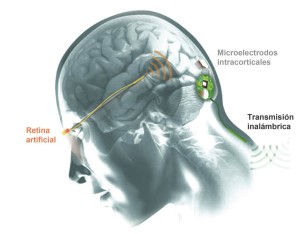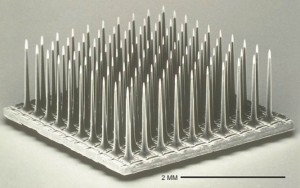The UMH and the ONCE collaborate in the development of a new visual neuroprosthesis that helps visually impaired persons improve their mobility
Campus, Convenios, Fuente, University, Investigación, Noticia, Noticia con foto, Noticia portada UMH, Others, Others, Front UMH, Sant Joan d'Alacant, Servicios UMH
16 March 2016
Design an advanced system that assists persons who are blind or have low residual vision improve their mobility. This is the objective of research at the Miguel Hernández University of Elche (UMH), in collaboration with the ONCE (National Organization of Spanish Blind people), coordinated by the Director of the UMH Biomedical Neuroengineering Group, Eduardo Fernández Jover. The main challenge of this effort is to design and develop a new system based on small intracerebral microelectrodes that, when implanted within the brain via an operation, helps persons who are blind or have low residual vision improve their mobility and even perceive the environment surrounding them and orient themselves within it.
Currently, some devices do exist, such as the ARGUS II system, which are implanted at eye level in some patients with degenerative diseases of the retina. However, these devices are ineffective when there is substantial degeneration to all retinal layers or in blindness deriving from other pathologies, such as glaucoma, diabetic retinopathy, ocular trauma, optical nerve injuries, or alterations in the visual pathways present subsequent to certain problems in the brain. No effective treatment is available today for most of these cases, so this new technology could open new treatment options and help improve the quality of life in these persons.
With assistance from the ONCE, the UMH researchers conduct studies on the plastic modifications that result in the brains of blind patients as a consequence of their adaptation to their loss of vision. Furthermore, they intend to develop action protocols to learn beforehand who might be the best candidates for this type of therapeutic approach. Likewise, the UMH administers surveys to learn the opinions of persons with different visual disabilities about these new devices, in addition to the minimum requirements necessary for improving their autonomy effectively.
The ONCE fulfills its social mission with diverse projects that favor personal autonomy, complete social inclusion, and the defense of the rights of its members, without forgetting about equal opportunity, as citizens with full rights they are.
To develop its objectives, the ONCE is based on the provision of multiple services and the implementation of various activities, among which its commitment to promoting R&D&I in matters of blindness and visual deficiency stands out, through its collaboration in research projects related to the ophthalmological pathologies that more frequently are the causes of partial or total blindness.
Through this collaboration, the ONCE strives to stimulate the latest and most innovative scientific knowledge on blindness and visual deficiency to promote prevention and the development of effective therapies.

